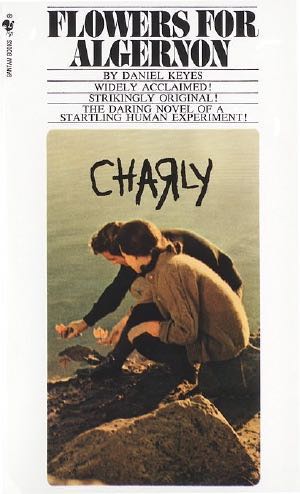Flowers for Algernon
Reviewed date: 2005 Jun 16
Rating: 4
216 pages
Awards: 1960 Hugo Best Short Fiction, 1966 Nebula Best Novel
Brain damaged Charlie Gordon works a menial job at a Mr. Donner's bakery. His IQ of 68 leaves him with an awareness that he is different from other people. When he learns about an experimental operation that could make him smart, he takes the chance.
Charlie keeps a journal from the start of the experiment. The operation is a success. His journal entries gradually become more sophisticated; he learns proper spelling and grammar, and he develops critical thinking skills. Quickly his intelligence outstrips even the scientists who developed the experimental procedure.
But as his intelligence increases, so does his awareness of his situation. The people who previously were his friends are revealed to be cruelly abusing him for their own amusement. Those who pitied him as a moron now are afraid of him. And though Charlie's intelligence increases, his emotional maturity is still years behind. He understands intellectually but he is still a child.
Flowers for Algernon is told in diary format, making the story even more heartbreaking--for we see and understand in advance some of the awful discoveries Charlie will make when he gets smarter. The novella version of the story is more famous than the novel, and perhaps the greater length of the novel causes the story to lose some of its impact. It bogs down slightly when it pauses to explore Charlie's psychosexual development--which I believe is not present in the novella (though I could be mistaken.) Still, the novel is excellent.
